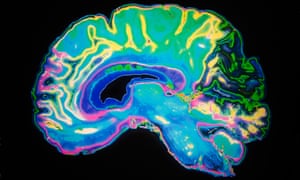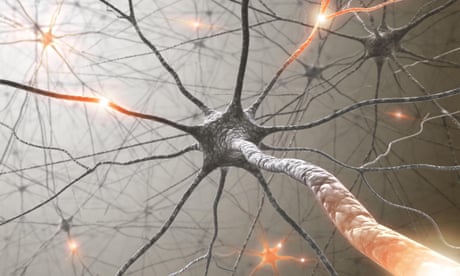Tests show compound, similar to that found in energy drinks, clears amyloid beta plaques, which build up in the brain in early stages of Alzheimer’s

An MRI scan of a human brain. Work on the new compound is at a very early stage, but raises hopes for new drugs to halt the progression of Alzheimer’s. Photograph: Alamy
Tuesday 8 December 2015 16.00 GMTLast modified on Tuesday 8 December 201516.02 GMT
Scientists have discovered a chemical that destroys toxic plaques which build up in the brain in the early stages of Alzheimer’s disease.
Preliminary tests found that when added to drinking water, the compound cleared amyloid beta plaques from the brains of mice with Alzheimer’s-like symptoms, and restored their cognitive function to normal.

Asthma drug could rejuvenate ageing brains, study suggests
The work is at a very early stage, but raises hopes for drugs that can prevent the accumulation of amyloid plaques and potentially halt the progression of the disease. Amyloid plaques are one of the first hallmarks of Alzheimer’s disease and are thought to contribute to neurodegeneration by killing off brain cells.
Researchers in Korea discovered the chemical, EPPS, while screening a variety of molecules for their effects on amyloid plaques. In the latest study, they added the substance to the drinking water of mice that had symptoms of Alzheimer’s disease. They found that administering EPPS for a week improved how well mice performed on maze tests, and cleared amyloid plaques from the animals’ brains.
“Our findings clearly support the view that aggregated amyloid-beta is the pathological culprit of Alzheimer’s disease,” said YoungSoo Kim, who led the team at the Korea Institute of Science and Technology in Seoul.
The study used mice that had amyloid plaques injected into their brains. The animals suffered cognitive impairments as a result, but they did not develop the kind of widespread brain damage seen in Alzheimer’s patients which would not be reversed by removing amyloid plaques.
“I do not believe EPPS or other amyloid clearing drug candidates will make Alzheimer patients recover their damaged brains,” said Kim, whose study appears in Nature Communications. “However, I strongly believe these drug candidates will halt the neurodegeneration and rescue patients from death.”
Far more work will be needed to prove that EPPS or related compounds have the potential to improve dementia in humans. The compound’s toxicity in humans is so far unknown. Kim said none of the mice in the latest study experienced bad side effects. The chemical, he adds, is very similar to taurine, an amino acid found in Red Bull and other energy drinks.
Extensive studies are also be needed to investigate whether the compound is effective in humans. Many compounds that look encouraging in mouse studies turn out to have no effect in people, or even make the disease worse.

Scientists find first drug that appears to slow Alzheimer's disease
Kim agrees that much more work lies ahead, but he believes that drugs which destroy amyloid plaques could benefit Alzheimer’s patients if they can be given early enough in the course of the disease. The plaques build up over a decade or more before Alzheimer’s patients develop serious damage and suffer mental impairments.
Teams elsewhere have taken steps towards drugs that remove amyloid plaques. One approach is to designantibodies that bind to and then break them down.
James Pickett, head of research at the leading dementia charity, Alzheimer’s Society said: “While new insights into potential ways to treat Alzheimer’s disease are welcome, in this case, it’s too early to say if this will one day benefit people living with Alzheimer’s. This study has found a new chemical that could help to clear some forms of amyloid, the toxic protein that is a hallmark of Alzheimer’s disease. However, so far this has only been shown in mice, which do not fully replicate several of the important changes that we see in the brains and behaviours of people with dementia.
“We are working to increase our understanding of Alzheimer’s disease all the time, and there are already a number of drugs in clinical testing that are targeted against amyloid. We hope that new findings will one day translate into real treatments for people living with dementia.”
Tuesday 8 December 2015 16.00 GMTLast modified on Tuesday 8 December 201516.02 GMT
Scientists have discovered a chemical that destroys toxic plaques which build up in the brain in the early stages of Alzheimer’s disease.
Preliminary tests found that when added to drinking water, the compound cleared amyloid beta plaques from the brains of mice with Alzheimer’s-like symptoms, and restored their cognitive function to normal.

Asthma drug could rejuvenate ageing brains, study suggests
The work is at a very early stage, but raises hopes for drugs that can prevent the accumulation of amyloid plaques and potentially halt the progression of the disease. Amyloid plaques are one of the first hallmarks of Alzheimer’s disease and are thought to contribute to neurodegeneration by killing off brain cells.
Researchers in Korea discovered the chemical, EPPS, while screening a variety of molecules for their effects on amyloid plaques. In the latest study, they added the substance to the drinking water of mice that had symptoms of Alzheimer’s disease. They found that administering EPPS for a week improved how well mice performed on maze tests, and cleared amyloid plaques from the animals’ brains.
“Our findings clearly support the view that aggregated amyloid-beta is the pathological culprit of Alzheimer’s disease,” said YoungSoo Kim, who led the team at the Korea Institute of Science and Technology in Seoul.
The study used mice that had amyloid plaques injected into their brains. The animals suffered cognitive impairments as a result, but they did not develop the kind of widespread brain damage seen in Alzheimer’s patients which would not be reversed by removing amyloid plaques.
“I do not believe EPPS or other amyloid clearing drug candidates will make Alzheimer patients recover their damaged brains,” said Kim, whose study appears in Nature Communications. “However, I strongly believe these drug candidates will halt the neurodegeneration and rescue patients from death.”
Far more work will be needed to prove that EPPS or related compounds have the potential to improve dementia in humans. The compound’s toxicity in humans is so far unknown. Kim said none of the mice in the latest study experienced bad side effects. The chemical, he adds, is very similar to taurine, an amino acid found in Red Bull and other energy drinks.
Extensive studies are also be needed to investigate whether the compound is effective in humans. Many compounds that look encouraging in mouse studies turn out to have no effect in people, or even make the disease worse.

Scientists find first drug that appears to slow Alzheimer's disease
Kim agrees that much more work lies ahead, but he believes that drugs which destroy amyloid plaques could benefit Alzheimer’s patients if they can be given early enough in the course of the disease. The plaques build up over a decade or more before Alzheimer’s patients develop serious damage and suffer mental impairments.
Teams elsewhere have taken steps towards drugs that remove amyloid plaques. One approach is to designantibodies that bind to and then break them down.
James Pickett, head of research at the leading dementia charity, Alzheimer’s Society said: “While new insights into potential ways to treat Alzheimer’s disease are welcome, in this case, it’s too early to say if this will one day benefit people living with Alzheimer’s. This study has found a new chemical that could help to clear some forms of amyloid, the toxic protein that is a hallmark of Alzheimer’s disease. However, so far this has only been shown in mice, which do not fully replicate several of the important changes that we see in the brains and behaviours of people with dementia.
“We are working to increase our understanding of Alzheimer’s disease all the time, and there are already a number of drugs in clinical testing that are targeted against amyloid. We hope that new findings will one day translate into real treatments for people living with dementia.”
No comments:
Post a Comment